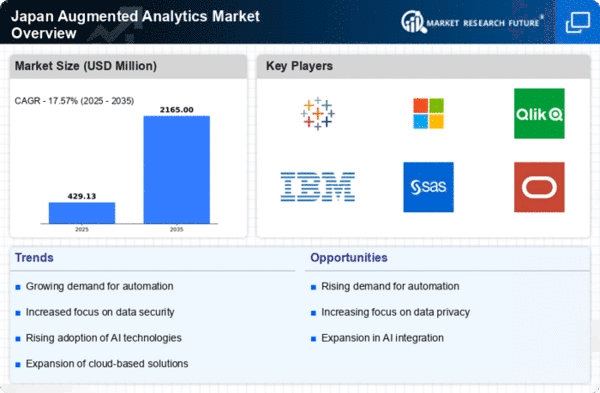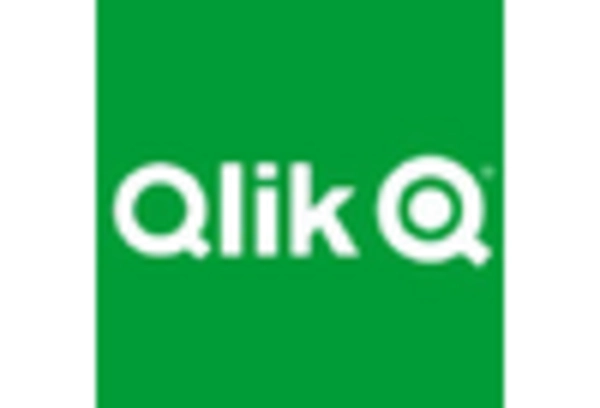Rising Importance of Data Literacy
The augmented analytics market in Japan is witnessing a notable shift towards enhancing data literacy among employees. As organizations recognize that data-driven decision-making is vital for success, they are investing in training programs to improve the analytical skills of their workforce. This focus on data literacy is expected to increase the adoption of augmented analytics tools, as employees become more capable of interpreting and utilizing data effectively. Reports suggest that companies with higher data literacy levels are 5 times more likely to make faster decisions than their counterparts. Consequently, this emphasis on education and skill development is likely to bolster the augmented analytics market, as businesses seek to empower their teams with the necessary tools and knowledge to thrive in a data-centric environment.
Growing Demand for Real-Time Insights
The augmented analytics market in Japan is experiencing a surge in demand for real-time insights, driven by the need for businesses to make informed decisions swiftly. Companies are increasingly recognizing the value of data-driven strategies, which has led to a projected growth rate of approximately 25% annually in this sector. This trend is particularly evident in industries such as finance and retail, where timely data analysis can significantly impact operational efficiency and customer satisfaction. As organizations strive to enhance their competitive edge, the adoption of augmented analytics tools that facilitate real-time data processing and visualization is becoming essential. This growing demand is likely to propel the augmented analytics market forward, as businesses seek to leverage advanced analytics capabilities to respond to market changes and consumer preferences more effectively.
Increased Investment in Digital Transformation
In Japan, the augmented analytics market is benefiting from heightened investment in digital transformation initiatives across various sectors. Organizations are allocating substantial budgets to upgrade their data infrastructure and analytics capabilities, with estimates suggesting that spending in this area could reach ¥1 trillion by 2026. This investment is aimed at enhancing data accessibility and fostering a culture of data-driven decision-making. As companies transition to more digital operations, the integration of augmented analytics tools becomes crucial for extracting actionable insights from vast amounts of data. This trend indicates a strong commitment to leveraging technology for improved business outcomes, thereby driving the growth of the augmented analytics market in Japan.
Regulatory Compliance and Data Security Concerns
In Japan, the augmented analytics market is significantly influenced by regulatory compliance and data security concerns. As data privacy regulations become more stringent, organizations are compelled to adopt analytics solutions that not only provide insights but also ensure compliance with legal standards. This has led to an increased demand for augmented analytics tools that incorporate robust security features and data governance capabilities. Companies are likely to invest in solutions that can help them navigate the complex landscape of data regulations while still deriving valuable insights from their data. This focus on compliance and security is expected to drive growth in the augmented analytics market, as businesses prioritize the protection of sensitive information while leveraging analytics for strategic decision-making.
Emergence of Advanced Machine Learning Techniques
The augmented analytics market in Japan is being propelled by the emergence of advanced machine learning techniques that enhance data analysis capabilities. These techniques enable organizations to uncover hidden patterns and trends within their data, leading to more accurate predictions and insights. As machine learning continues to evolve, its integration into augmented analytics tools is becoming increasingly sophisticated, allowing for automated data preparation and analysis. This advancement is particularly relevant in sectors such as healthcare and manufacturing, where predictive analytics can drive operational efficiencies and improve outcomes. The growing reliance on machine learning in the augmented analytics market suggests a promising future, as businesses seek to harness the power of AI to gain a competitive advantage.
















